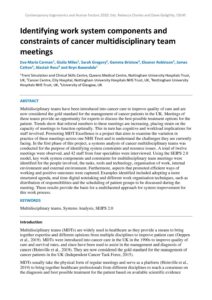| Document | Author Eva-Maria Carman, Giulia Miles, Sarah Gregory, Gemma Bristow, Eleanor Robinson, James Catton, Alastair Ross and Bryn Baxendale |
| Abstract Multidisciplinary teams have been introduced into cancer care to improve quality of care and are now considered the gold standard for the management of cancer patients in the UK. Meetings of these teams provide an opportunity for experts to discuss the best possible treatment options for the patient. Trends show that referral numbers to these meetings are increasing, placing strain on the capacity of meetings to function optimally. This in turn has cognitive and workload implications for staff involved. Promoting MDT Excellence is a project that aims to examine the variation in practice of these meetings across one NHS Trust and to understand the challenges they are currently facing. In the first phase of this project, a systems analysis of cancer multidisciplinary teams was conducted for the purpose of identifying system constraints and resource issues. A total of twelve meetings were observed, and 42 staff from four specialties were interviewed. Using the SEIPS 2.0 model, key work system components and constraints for multidisciplinary team meetings were identified for the people involved, the tasks, tools and technology, organisation of work, internal environment and external environment. Furthermore, aspects that promoted efficient ways of working and positive outcomes were captured. Examples identified included adopting a more structured agenda, real time digital notetaking and different work organisation techniques, such as distribution of responsibilities and the scheduling of patient groups to be discussed during the meeting. These results provide the basis for a multifaceted approach for system improvement for this work process. |

